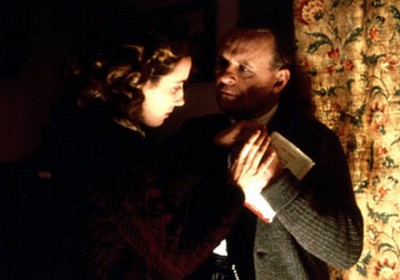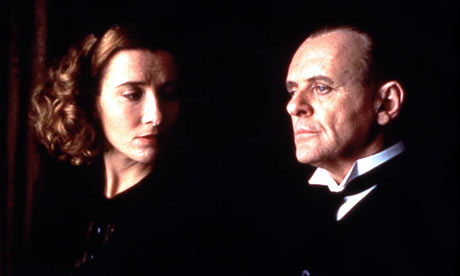In 1950s England, Mr. Stevens (Anthony Hopkins), the emotionally-repressed butler of Darlington Hall, receives a letter from Miss Kenton (Emma Thompson), who worked with him as housekeeper during the years prior to the Second World War. Twenty years later, Lord Darlington (James Fox) has died, and his stately country manor has been sold to a retired American Congressman, Mr. Lewis (Christopher Reeve). Kenton reveals that her marriage has failed and that she is nostalgic for the days when she worked at the house. Stevens (who is now one of the few servants from Darlington's era left) goes to visit Miss Kenton, ostensibly to persuade her to return to service.From there we see how Mr. Stevens and Miss Kenton interact. Mr. Stevens is always a professional, never letting personal problems or opinions of his own disrupt his service to his employer. This occasionally clashes with Miss Kenton's more outspoken personality. But this isn't exactly a "fire and ice" sort of relationship; it's not that obvious. But there's an obvious connection between the two of them that never gets explored because of Mr. Stevens' dedication to his work. On the few occasions Miss Kenton tries to get him to open up, he always clams up or is interrupted by his duty as a butler.
The film flashes back to Kenton's arrival as housekeeper. (wiki)
 One scene when his inhibitions are painfully evident is when Miss Kenton comes to his private office with some flowers to decorate the place. Seeing that Mr. Stevens is reading, Miss Kenton asks him what he's reading. He refuses to tell her and somehow ends up out his chair and against a wall with no escape from Miss Kenton. She keeps lightly, almost flirtatiously, asking. She ends up prying his fingers off the book to look at it; meanwhile, Stevens just looks at her face as she works to get the book out of his hands, acutely aware of their proximity. When it's discovered that's a sentimental love story, Mr. Stevens makes a quick excuse about how it helps him further his education, and Miss Kenton leaves. Rarely have I ever seen a scene with so much tension, and it's all because of Mr. Stevens' inability to respond to this younger woman. We don't know exactly what's going on in his head, but he's undoubtedly awkward. We get the impression he's never been in a situation like this.
One scene when his inhibitions are painfully evident is when Miss Kenton comes to his private office with some flowers to decorate the place. Seeing that Mr. Stevens is reading, Miss Kenton asks him what he's reading. He refuses to tell her and somehow ends up out his chair and against a wall with no escape from Miss Kenton. She keeps lightly, almost flirtatiously, asking. She ends up prying his fingers off the book to look at it; meanwhile, Stevens just looks at her face as she works to get the book out of his hands, acutely aware of their proximity. When it's discovered that's a sentimental love story, Mr. Stevens makes a quick excuse about how it helps him further his education, and Miss Kenton leaves. Rarely have I ever seen a scene with so much tension, and it's all because of Mr. Stevens' inability to respond to this younger woman. We don't know exactly what's going on in his head, but he's undoubtedly awkward. We get the impression he's never been in a situation like this.However, most of the film is spent on the mundane tasks of service givers at Darlington Hall and listening to the discussions from the important politician that visit the house. In fact, an entire subplot deals with Lord Darlington's involvement with appeasement toward Nazi Germany. This serves to demonstrate Mr. Stevens' lack of emotion as much as anything else. When Lord Darlington's Grandson Reginald (Hugh Grant) sits Stevens down to voice his disapproval of appeasement, Stevens doesn't give any approval or disapproval at all. He doesn't find his opinion important to his role in life, even for something as heinous as genocide and antisemitism.
 None of this is ever said though, which is why I find this film so lovely. It actually uses the medium of cinema to create a story. We see what happens, and are never told explicitly. The music never gives us easy answers either. Whether the scene is showing a speech supporting intervention in Germany, silverware is being set up precisely, or Mr. Stevens and Miss Kenton are disagreeing, the music is fast paced, tense music. Nothing is sentimentalized or given special treatment so we read into these scenes what we want.
None of this is ever said though, which is why I find this film so lovely. It actually uses the medium of cinema to create a story. We see what happens, and are never told explicitly. The music never gives us easy answers either. Whether the scene is showing a speech supporting intervention in Germany, silverware is being set up precisely, or Mr. Stevens and Miss Kenton are disagreeing, the music is fast paced, tense music. Nothing is sentimentalized or given special treatment so we read into these scenes what we want.I can see this film being boring to some, except I find Anthony Hopkins' portrayal as Mr. Stevens endlessly fascinating and subtle. Everything from his posture to his tone of voice lets us know how dedicated Stevens is to his job. In fact, it's his whole life, and it ruins his chance at real friendship, let alone a romantic relationship. And Emma Thompson does a wonderful job of playing off of Mr. Stevens nonresponsive personality, being persistent and sometimes playful, but always respectful who Mr. Stevens is. But Hopkins really makes this movie worth watching. Just waiting for a little change in his facial expression to see if anything affects the unflappable Mr. Stevens. Will he ever crack?
The Remains of the Day is one of the best romances ever filmed. There is something about delayed gratification and the skillfully downbeat ending that stays with me longer than a resolution where everyone hugs and lives happily ever after.
ReplyDeleteThis movie works on so many different levels, documenting a great house and the upstairs/downstairs relationship between servants and their masters, as well as country life in England prior to WWII. As you mentioned, Hopkins and Thompson are gifted beyond words and demonstrate why in this film.
I make it a habit of recommending this flick to friends or family before taking them on a visit to Hearst Castle. I'm glad you're already ahead of the curve, Kelsy.
The feeling of this movie definitely stayed me well into the next day. The only other romantic movie that left me with a similar feeling is In the Mood for Love, which also plays with delayed gratification.
ReplyDelete